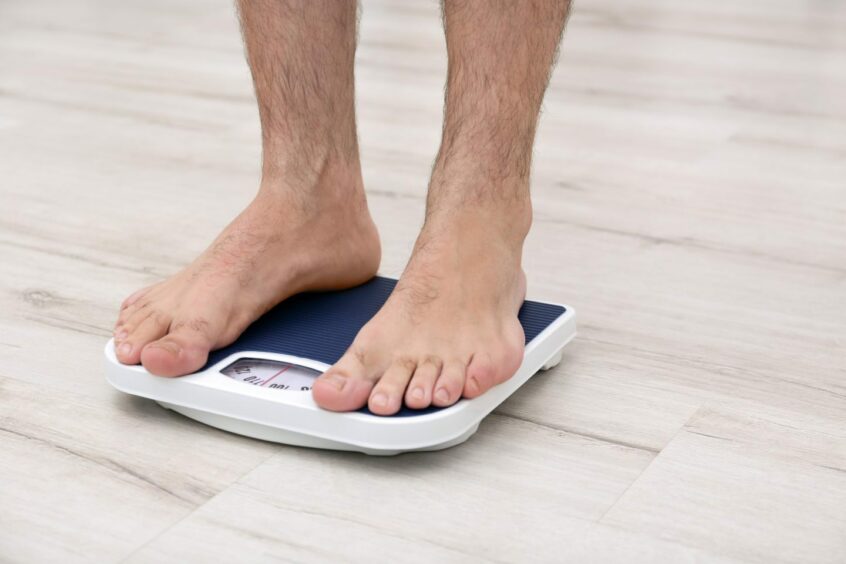
When we looked at the statistics from our clinical system in 2020 – pre-pandemic – we noted that the average size of offshore workers had increased from 75kg in 1975 to 95kg in 2020.
Following the pandemic, the increase in passenger size is even more concerning, with an increase in the last three years of an average of a further 4kg – in 2023, the average passenger size has now increased to 99kg, with the average BMI increasing from 27.8 in 2020, to 28.66 in 2023.
The ideal BMI is between 18.5 – 24.9. A BMI of 25 – 30 is considered ‘overweight’; and a BMI of 30 or over is classed as ‘obese’.
In 2022, just under 20% of patients who attended our clinics for an OEUK medical had a BMI of greater than 30.
Shoulder measurements have also increased from an average of 47.5cm in 2020, to 53.9 cm in 2023.
These statistics may have implications for helicopter transport, lifeboats, sick bay equipment offshore – which is often not approved for people with a weight of over 130kg – and also for the health and safety of the Emergency Response Team and stretcher-bearers offshore, if dealing with a heavier casualty.
But what are the implications for the health of the offshore population?
Weight gain in general is associated with various health risks, including Type 2 diabetes, hypertension, raised cholesterol, and of course cardiovascular disease, which remains the number one reason for emergency medevacs.
Cardiovascular disease includes conditions such as coronary artery disease, stroke and peripheral arterial disease.
What can organisations and individuals do to try to reverse the significant increase in passenger size and avoid an increase in cardiovascular disease and other associated health problems?
Apart from the obvious implications for your health, these conditions can affect your fitness for work – someone who has suffered a heart attack or a stroke will not be able to return offshore for a period of time afterwards and is subject to an assessment of recovery – and your mental health.
Most cardiovascular diseases are preventable and treatable. Behaviours – unhealthy diet, physical inactivity, smoking and excessive or binge alcohol use – can be changed. And conditions such as high blood pressure, high cholesterol and Type 2 diabetes can be controlled.
Organisations can ensure that people have access to healthy meal options offshore. Our offshore medics have introduced initiatives to encourage exercise, and there are regular health promotion initiatives to increase awareness of the risk factors.
Lifestyle assessments can be a valuable tool – people are given details of their individual profile – height, weight, BMI, blood pressure, etc – and have the information to enable them to put in place any lifestyle improvements required.
What if the worst happens, and somebody does suffer a cardiac event, either offshore or elsewhere?
Fewer than one in ten people survive an out-of-hospital cardiac arrest in the UK. However, survival rates with the early use of CPR and defibrillation can be as high as 40%.
The offshore environment, with the medic and Emergency Response Team on hand close by, is one of the safest places to suffer a cardiac arrest – 42% of people who suffer a cardiac arrest offshore in the UKCS survive to go home from hospital.
The Resuscitation Council’s advice is that, for every minute that someone is in cardiac arrest without receiving CPR and having a defibrillator used on them, their chance of survival decreases by 10%.
Organisations can ensure that there is adequate provision of AEDs – ideally accessible within 3 minutes.
They can also ensure staff have had CPR/AED training and have rehearsed plans for dealing with a cardiac event.
Our medics undergo annual Advanced Life Support and trauma management training; and we also offer a Medical Emergency Response Team course for ERTs to assist them in dealing with a life-threatening medical or trauma-related emergency offshore.
The most important point, of course, is that people should be aware of the issue and do what they can to make changes to an unhealthy lifestyle.
Medical assessments designed for offshore workers will look at your risk factors – people should listen to any advice given and act on it.
The QRISK3 algorithm, for example, calculates a person’s risk of developing a heart attack or stroke over the next 10 years.
If people know their risk, they are able to adapt their behaviours to ensure that their chance of developing cardiovascular disease is greatly reduced.
Many people are following the advice and making changes to their diet and fitness regime – we need to find a way of encouraging everybody to adopt a healthier lifestyle.
Recommended for you
